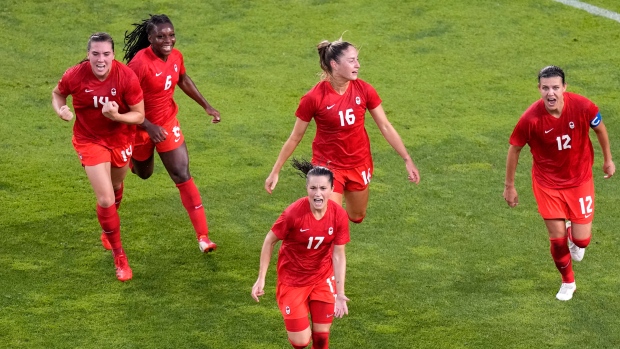Aug 4, 2021
Canada’s current generation aims to be golden
For everything that Christine Sinclair has done for the national team, the Tokyo Olympics have been a passing of the torch to Canada’s current generation of younger players. It’s a group that has demonstrated the team is in good hands going forward as they go for gold against Sweden.
, TSN.ca Staff

When the final whistle blew in the fourth minute of stoppage time at Ibaraki Kashima Stadium on Monday in Tokyo, jubilant screams and cheers from Team Canada filled the empty stadium as they celebrated one of the biggest moments in Canadian soccer history.
For the first time since March 11, 2001, Canada beat their biggest rival in the United States. The 1-0 semifinal victory earned the team its first-ever trip to an Olympic gold-medal game. It was also a bit of redemption for Canada, as they avenged that infamous 2012 semifinal loss at the London Olympics to the Americans.
For Canadian captain Christine Sinclair, who has carried the national team on her back for two decades, it’s the opportunity to play for one of the biggest titles women’s soccer has to offer. The world’s leading international scorer at 187 goals, her resume is filled with accolades, but a Women’s World Cup and Olympic gold medal have eluded her.
That can change on Friday when Canada faces Sweden, the same team that knocked Canada out of the 2019 Women’s World Cup in the round of 16.
For everything that Sinclair has done for the national team, this Olympic tournament has been a passing of the torch to Canada’s current generation of younger players. It’s a group that has demonstrated the team is in good hands going forward.
The defining moment of the torch being passed came on Monday as Sinclair handed the ball to 23-year-old midfielder Jessie Fleming to take that crucial penalty kick for Canada in the 72nd minute, a kick that became possible after 22-year-old midfielder Deanne Rose drew a foul off of defender Tierna Davidson in the Americans’ 18-year box.
The London, Ont. native didn’t disappoint. Fleming’s penalty kick found its way past American goalkeeper Adrianna Franch, sending Canada to its historic victory.
Fleming, who made her senior international debut at the age of 15, has long been regarded as one of the players carrying the torch forward for Canada as part of its current generation. With 89 caps already under her belt, she delivered when it mattered most.
While Fleming was the hero on Monday, she isn’t the only player of this current generation making an impact.
Joining Fleming in Canada’s midfield is Quinn, who was part of the bronze-medal winning squad in Rio in 2016. Making their debut with the senior team in 2014, Quinn has continued to establish themselves as a mainstay in the starting lineup.
They will become the first openly transgender and non-binary athlete to win an Olympic medal with Canada guaranteed a gold or silver. The Toronto, Ont. native came out in September 2020 in a social media post.
Defenders Kadeisha Buchanan and Ashley Lawrence, who are 25 and 26 respectively, have both logged more than 100 caps for Canada. Buchanan has been Canadian Women’s Player of the Year three times (2015, 2017 and 2020) and Lawrence once in 2019. Both players have been pillars for years with the national team. Lawrence has arguably been Canada’s best player in Tokyo with her strong two-way play.
Forward Janine Beckie has continued to grow as a leader for Canada, and the 26-year-old had a brace in group play to send Canada past Chile.
Another player who has emerged as important player for Canada has been defender Vanessa Gilles, who had 19 clearances in the semifinal against the U.S. and the game-winning penalty kick against Brazil. With only nine career caps for Canada, the 25-year-old has forced her way into the starting lineup alongside well-established veterans like Buchanan, Lawrence and Allysha Chapman.
After Sinclair missed her penalty kick in the quarter-final against Brazil, it was Fleming, Lawrence, Adriana Leon and Gilles who stepped up to score, while goalkeeper Stephanie Labbé made two big stops to send Canada to the next round.
Sinclair and veteran midfielder Desiree Scott were the only players on the field for Canada in the semifinal against the U.S. who were a part of that 2012 team in London (Sophie Schmidt and Erin McLeod were on the sidelines but not dressed).
Sinclair (38), Scott and Labbé (both 34) have all played important roles in Tokyo but it’s clear that Canada’s current generation has firmly established themselves as the present and future of the team.
With a gold medal on the line Thursday, more history is waiting to be written.
